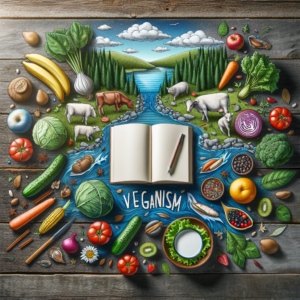Are you curious about the growing trend of vegan parenting? We are here to provide you with a sneak peek into the world of raising children on a vegan lifestyle. From nutrition tips to debunking myths, we will explore the benefits and challenges that come with embracing plant-based parenting. Get ready to discover how veganism can shape the way families nourish their bodies and contribute to a more sustainable future for all.

The Basics of Vegan Parenting
Veganism is a lifestyle that involves abstaining from the use of animal products or by-products, not only in diet but also in everyday life. Vegan parenting, therefore, refers to individuals who choose to raise their children on a vegan diet, and also teach them the principles of compassion towards animals and the environment.
Understanding Veganism
At its core, veganism promotes a way of living that seeks to minimize the exploitation and harm of animals. By adopting a vegan lifestyle, parents hope to instill empathy, kindness, and respect for all living beings in their children. This not only involves providing nutritious plant-based meals for their little ones but also extends to other aspects of their lives, such as choosing cruelty-free products and opting for clothing made from sustainable and ethical materials.
Benefits and Challenges of Vegan Parenting
There are numerous benefits to raising children on a vegan diet. Firstly, it encourages the consumption of whole foods, fruits, vegetables, legumes, and grains, which are rich in essential vitamins, minerals, and fiber. This can help foster healthy eating habits early on and reduce the risk of chronic diseases later in life. Additionally, vegan diets tend to be lower in saturated fats, cholesterol, and processed foods, which can contribute to maintaining a healthy weight and reducing the risk of heart disease and obesity.
However, it is important to acknowledge that vegan parenting does come with its challenges. Ensuring adequate nutrient intake, addressing common misconceptions about veganism, and navigating social situations and school can all pose difficulties. Nevertheless, with proper education, planning, and support, these challenges can be overcome, and vegan parenting can be a rewarding and fulfilling journey for both parents and children.
Plant-Based Nutrition for Children
Meeting the nutritional needs of children on a vegan diet is essential for their growth and development. While it may require a bit of extra attention and planning, providing a balanced and varied diet can ensure that children receive all the nutrients they need to thrive.
Preparing for a Vegan Pregnancy
If you’re considering embarking on a vegan pregnancy journey, it’s important to consult with healthcare professionals before making any substantial changes to your diet. They can provide guidance and support, as well as address any concerns or potential risks associated with veganism during pregnancy.
Consulting with Healthcare Professionals
During pregnancy, it is crucial to ensure that both the mother and the growing baby receive sufficient nutrients for optimal health. Consulting with a healthcare professional who understands the intricacies of a vegan diet can help identify any potential nutritional gaps and develop an appropriate plan to meet those needs.
Meeting Nutritional Needs
A well-planned vegan diet can meet all the nutrient requirements during pregnancy. Emphasizing nutrient-dense whole foods, such as leafy greens, legumes, whole grains, and fruits, will provide essential vitamins and minerals. Paying attention to key nutrients like iron, calcium, vitamin D, omega-3 fatty acids, and vitamin B12 is especially important.
Supplements for Pregnant Vegans
Certain supplements may also be necessary for pregnant vegans to ensure adequate nutrition. For example, plant-based sources of iron may not be as easily absorbed as iron from animal products, so an iron supplement may be recommended. Additionally, considering a vitamin B12 supplement is important since it is primarily found in animal-based foods.
Vegan Diets for Infants and Toddlers
Breastfeeding is a natural and healthy option for vegan mothers and can provide a newborn with essential nutrients for the first six months of life. After that, it is crucial to introduce solid foods that meet the nutritional requirements of growing infants and toddlers.
Breastfeeding for Vegan Mothers
Breast milk is the optimal source of nutrition for infants, providing essential nutrients and antibodies for their healthy development. Vegan mothers can continue to breastfeed by ensuring they consume a well-rounded diet that includes sufficient calories, protein, omega-3 fatty acids, and other nutrients.
Introducing Solid Foods
When it comes time to introduce solid foods, parents can start with mashed fruits and vegetables, gradually transitioning to cooked whole grains, legumes, and tofu. Care should be taken to provide a variety of foods to ensure a well-rounded diet and meet the changing nutritional needs as the child grows.
Ensuring Adequate Nutrient Intake
As children transition from breast milk to solid foods, it is important to ensure they receive appropriate nutrients from their diet. Paying attention to key nutrients like iron, calcium, vitamin D, and vitamin B12 is essential. Offering a variety of foods rich in these nutrients, and considering fortified foods or supplements when necessary, can help meet their growing needs.
Balancing Macronutrients for Growing Children
While providing a variety of nutrient-dense plant foods is vital, it is equally important to consider the balance of macronutrients, such as proteins, fats, and carbohydrates, to support proper growth and development in vegan children.
Protein Sources for Vegan Kids
Protein is crucial for growth and development, and vegan children can obtain sufficient protein from various plant sources, such as legumes (beans, lentils, chickpeas), tofu, tempeh, seitan, and edamame. Incorporating a variety of protein-rich foods into meals and snacks can help ensure adequate intake.
Healthy Fat Requirements
Healthy fats play a vital role in brain development and overall health. Vegan children can obtain healthy fats from sources such as avocados, nuts, seeds, and plant-based oils like olive oil and coconut oil. Including these fats in their diet can help support their cognitive function and ensure proper growth.
Carbohydrates in a Vegan Diet
Carbohydrates are an important energy source for growing children. Providing whole grains, such as brown rice, quinoa, oats, and whole wheat bread, alongside fruits and vegetables, can supply the necessary energy to fuel their active lifestyles.

Meeting Micronutrient Needs
Vegan children, like any other children, need adequate amounts of micronutrients for their overall health and well-being. Paying attention to essential micronutrients like calcium, iron, vitamin B12, and iodine is crucial for their growth and development.
Calcium and Bone Health
Calcium is essential for bone health, and vegan children can obtain ample calcium from sources like fortified plant-based milk, tofu made with calcium sulfate, leafy greens, sesame seeds, and tahini. Including these calcium-rich foods in their diet can help support their bone development and prevent any deficiencies.
Iron Sources for Vegans
Iron is important for the production of red blood cells and overall energy levels. Vegan children can obtain iron from sources such as legumes, dark leafy greens, quinoa, fortified cereals, and dried fruits. Combining these iron-rich foods with a source of vitamin C, such as citrus fruits or bell peppers, can enhance iron absorption.
Vitamin B12 and Iodine
Vitamin B12 is primarily found in animal-based foods, so it is important for vegan children to supplement their diet. Fortified foods like plant-based milks, breakfast cereals, and nutritional yeast can also be excellent sources of vitamin B12. Additionally, incorporating iodized salt or seaweed into their meals can help ensure adequate iodine intake for proper thyroid function.
Navigating Social Situations and School
Vegan children may encounter challenges and misconceptions about their dietary choices in social situations and at school. However, with proper guidance and education, parents can help their children navigate these situations while still adhering to their vegan lifestyle and promoting understanding and respect.
Dealing with Criticism and Misconceptions
It is not uncommon for vegan children and their parents to face criticism or encounter misunderstandings about veganism. Encouraging open communication, educating others about the vegan lifestyle, and leading by example with empathy and respect can help address misconceptions and foster a more supportive environment.
Educating Teachers and Caregivers
Parents play a crucial role in advocating for their children’s dietary choices and ensuring their needs are met in school or daycare settings. Educating teachers and caregivers about veganism, providing resources and meal suggestions, and maintaining regular communication can help create a supportive environment that accommodates the child’s dietary requirements.
Packing Nutritious Vegan Lunches
Preparing nutritious vegan lunches for school can help ensure that vegan children have well-rounded meals that meet their nutritional needs. Combining a variety of whole grains, fruits, vegetables, legumes, and plant-based proteins in creative and appealing ways can make lunchtime enjoyable while also providing essential nutrients.

Building a Vegan Pantry
Creating a well-stocked vegan pantry is essential for easy meal planning and preparation. With a variety of pantry staples, protein sources, and vegan alternatives on hand, parents can create nutritious and delicious meals for their children.
Essential Vegan Pantry Staples
Stocking up on essentials like whole grains (rice, quinoa, oats), legumes (beans, lentils, chickpeas), nuts, seeds, plant-based milk, and a variety of spices can make it easier to whip up nutrient-dense meals. Having a selection of herbs, spices, and condiments can also add flavor and zest to vegan dishes.
Plant-Based Protein Sources
Plant-based proteins play a crucial role in a vegan diet and can be obtained from sources such as tofu, tempeh, seitan, legumes, quinoa, and hemp seeds. Keeping a selection of these protein sources in the pantry ensures that there are always options available to meet the child’s protein requirements.
Vegan Alternatives and Substitutes
Having vegan alternatives and substitutes on hand can help parents recreate vegan versions of their child’s favorite dishes. Products like plant-based milk, vegan cheese, mock meats, and egg replacers provide options for creating satisfying and familiar meals while adhering to a vegan lifestyle.
Raising an Ethical Vegan
Veganism not only encompasses dietary choices but also extends to teaching children about compassion, ethics, and animal welfare. Instilling these values at a young age can help children develop a deep sense of empathy and make choices that align with their beliefs.
Teaching Compassion and Animal Welfare
Parents can introduce the concept of compassion towards animals early on by teaching their children about the lives and needs of animals. Engaging in activities like visiting animal sanctuaries, reading age-appropriate books about animals, and having open discussions about animal rights can help foster a sense of empathy and understanding.
Explaining Veganism to Children
It is important to have age-appropriate conversations about veganism with children, explaining the reasons behind the dietary choices and the impact they have on animals, the environment, and their own health. Encouraging children to ask questions and providing honest and thoughtful answers helps them develop a clear understanding of why their family follows a vegan lifestyle.
Engaging in Activism and Advocacy
Parents can involve their children in age-appropriate activism and advocacy activities to empower them to make a positive impact. Participating in events like peaceful protests, supporting animal rescue organizations, or engaging in community service projects can help children connect with like-minded individuals and become advocates for a better world.

Addressing Health Concerns and Common Myths
There are common concerns and myths surrounding veganism, including its impact on growth, weight gain, and allergies. By addressing these concerns head-on and providing accurate information, parents can ensure that their children are healthy and well-informed.
Growth and Development
One common concern is whether vegan children can grow and develop properly on a plant-based diet. A well-planned and balanced vegan diet can meet all the nutritional needs of growing children, supporting healthy growth and development. Monitoring their growth through regular check-ups and working closely with healthcare professionals can provide reassurance.
Weight Gain and Obesity
Contrary to popular belief, a vegan diet can support healthy weight management in children. By emphasizing whole plant foods and limiting processed foods, vegan parents can promote a balanced diet that supports a healthy weight range. Regular physical activity and setting a positive example of a healthy lifestyle are also key factors in maintaining a healthy weight.
Veganism and Allergies
Food allergies can be a concern in any diet, and veganism does not exempt children from the risk of developing allergies. However, vegan diets can offer alternatives to common allergens like dairy and eggs. By familiarizing themselves with vegan alternatives and being mindful of ingredient labels, parents can provide safe and allergen-free options for their children.
Veganism and Teenagers
As children grow into their teenage years, their nutritional needs and lifestyle choices may change. It is important for vegan parents to address the unique considerations of veganism during this stage and empower their teenagers to make informed decisions.
Nutritional Considerations for Vegan Teens
During adolescence, energy needs increase, and teenagers may have additional nutritional requirements. Providing vegan teens with a well-balanced diet that includes a variety of plant-based protein sources, healthy fats, complex carbohydrates, and nutrient-dense foods is important for their growth, development, and overall well-being.
Coping with Peer Pressure
Teenagers often face peer pressure to conform, and being vegan can sometimes be seen as “different.” Supporting vegan teens by helping them navigate social situations, providing resources for dealing with criticism, and fostering a sense of community and support can help them stay true to their beliefs while promoting a healthy lifestyle.
Encouraging Independence and Education
As teenagers become more independent, it is crucial to encourage them to take ownership of their dietary choices and educate themselves about veganism. Providing resources, encouraging them to explore vegan recipes and meal planning, and involving them in grocery shopping and meal preparation can help build their confidence and ensure they maintain a healthy vegan lifestyle.
In conclusion, vegan parenting involves raising children on a plant-based diet while instilling values of compassion, respect, and ethical living. By understanding the basics of veganism, addressing nutritional needs at each stage of a child’s development, navigating social situations and school, building a well-stocked vegan pantry, promoting ethical values, addressing health concerns, and empowering teenagers, parents can provide a nurturing and supportive environment for their children to thrive as compassionate and healthy vegans.





